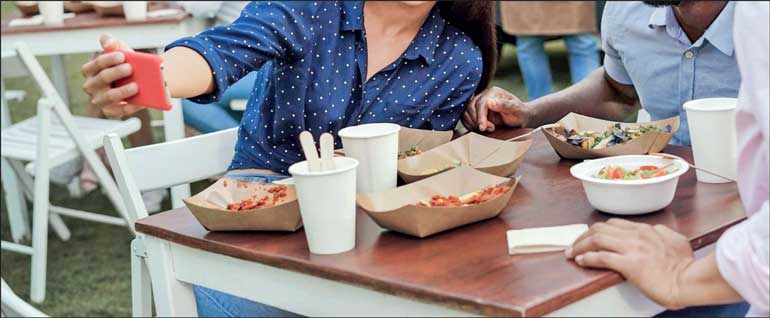Tuesday Feb 17, 2026
Tuesday Feb 17, 2026
Wednesday, 24 September 2025 00:22 - - {{hitsCtrl.values.hits}}

Eco-conscious travellers look for destinations that practise what they preach, and packaging, often overlooked, can reinforce Sri Lanka’s positioning as a responsible, ethical destination
 Sustainable food packaging is no longer about simply replacing plastic with paper. The real test lies in creating systems that deliver food safety, preserve shelf life, and meet consumer convenience, all while being environmentally responsible. What matters now is how packaging performs across its entire lifecycle: from raw material sourcing and production to disposal and reuse. That’s where real impact begins.
Sustainable food packaging is no longer about simply replacing plastic with paper. The real test lies in creating systems that deliver food safety, preserve shelf life, and meet consumer convenience, all while being environmentally responsible. What matters now is how packaging performs across its entire lifecycle: from raw material sourcing and production to disposal and reuse. That’s where real impact begins.
Sri Lanka is at a critical juncture. With food, agriculture, and tourism reorienting towards export-led growth, sustainability has shifted from being a “nice-to-have” to a decisive competitive advantage. International buyers are increasingly favouring partners who can demonstrate environmental accountability across their supply chains, and packaging has become a central component of that assessment. For Sri Lanka, embedding sustainable packaging practices today is about building a national brand around ethical and responsible production. This is an opening for the country to lead rather than follow.
Global lessons, local opportunities
Markets such as Malaysia and the UAE are already demonstrating how sustainable packaging can be a differentiator for exporters. Recyclable mono-materials, compostable trays, plant-based bioplastics, and water-based inks have gone mainstream. But for Sri Lanka, the path forward is not to mimic. The country’s agricultural by-products—banana fibre, coconut husk, rice husk, and sugarcane bagasse—present untapped potential for cost-effective, scalable alternatives. With targeted investment in research and development, these raw materials could be converted into world-class solutions that not only meet global demand but also showcase Sri Lanka’s unique strengths.
Technologies shaping the future
The global packaging industry is being rapidly reshaped by technologies that combine sustainability with commercial viability. Starch-based biodegradable wrappers, edible films, and bagasse-based containers are already entering mainstream use. Smart labelling systems with QR codes that track food safety, traceability, and even carbon footprints are fast becoming a standard in responsible supply chains. These aren’t concepts for the future, they are here and now. For Sri Lanka to stay competitive, swift adoption and localisation are critical.
Trade, tourism, and ESG advantage
Sustainable packaging offers Sri Lanka an edge across multiple industries. In tourism, it extends the country’s identity in an authentic way. Eco-conscious travellers look for destinations that practise what they preach, and packaging, often overlooked, can reinforce Sri Lanka’s positioning as a responsible, ethical destination.
In trade, sustainability in packaging strengthens alignment with Environmental, Social, and Governance (ESG) principles. It reduces reliance on fossil fuels, curbs carbon emissions, and limits plastic waste. Socially, it promotes healthier products and inclusive supply chains. From a governance lens, it signals transparency and long-term risk management—attributes increasingly prioritised by global investors and trade partners. For businesses eyeing sustainable capital flows and global market entry, these factors are no longer optional.
Unlocking change
Sri Lanka’s slow adoption has largely been the result of fragmented policies and limited innovation funding. What is needed now is a decisive push: streamlined approvals for green technologies, a credible national certification system, and targeted R&D grants. A coordinated public-private task force could ensure consistency and scale.
Industry too must act pragmatically. Beginning with achievable steps, securing resilient supply chains, and leveraging global best practices will help ease the transition. Those who move first will set the standards for others to follow.
The road ahead
Food-grade recycled plastics, such as rPET and HDPE, when backed by infrastructure and certification, can deliver safe reuse in food packaging. Equally, traceability and smart packaging technologies are poised to become the minimum entry requirement in global trade. Falling behind on these will cost Sri Lanka dearly.
The choice is whether to seize it now, or be left behind in a world where sustainability is no longer a luxury, but the price of entry.
(The writer is a C-suite strategist, board member, and consultant with 25+ years of leadership experience. He specialises in business operations, international market expansion, and manufacturing in biodegradable eco-friendly and flexible packaging, while also advising organisations on strategy, transformation, and growth at CEO and Managing Director level.)